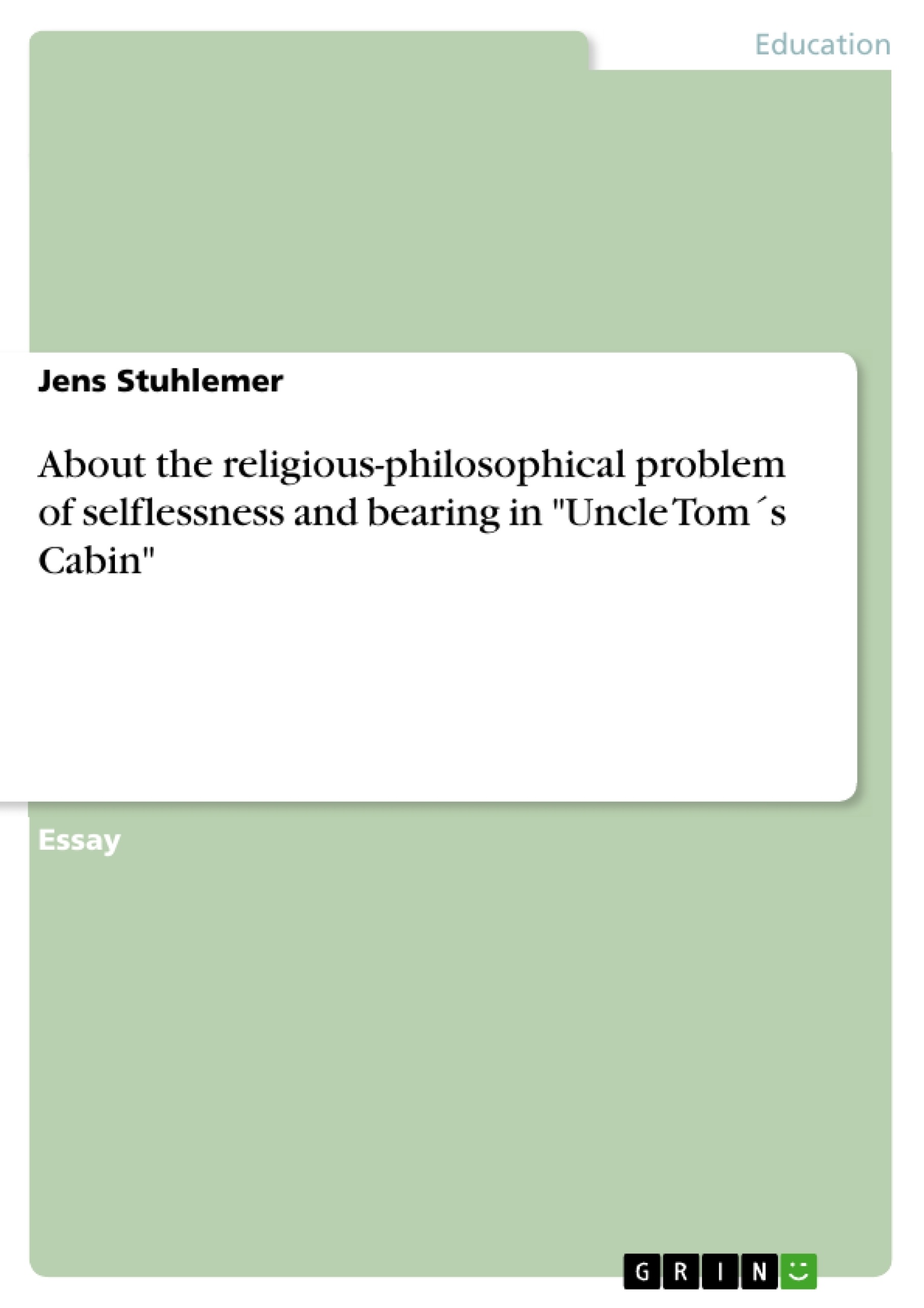Reaching for Christianity is one, maybe the most central theme in “Uncle Tom´s Cabin”. Stowe uses her view on religion as her main instrument to abolish slavery. The textual construction of Christian values throws up questions about their persuasiveness to a modern reader. To find answers to such questions it is necessary to itemize Stowe´s schema in order to question them from a modern point of view.
Harriet Beecher Stowe originates from a strongly Christian affected background. Her father, brother, and husband were all theologians. Stowe liked to say God inspired her to write “Uncle Tom´s Cabin” and that he even dictated her. It also must be mentioned, that most of her female readership also had a Christian background. This was not only based on the long American tradition of Christianity, but also on the idea of being the chosen country, pronounced in the Manifest Destiny. A whole country built itself upon the idea of a self given authority, which the white America saw as God given. This supported the common understanding of a new American race, which white America saw superior to the Afro-American population. White America not only thought of itself as more knowledgeable, but also as dominant rulers in the name of Christianity. But how is this evident in “Uncle Tom´s Cabin”? Which religious aspects need to be reviewed and which deserve critic?
Table of Contents
- Reaching for Christianity is one, maybe the most central theme in Uncle Tom's Cabin
- Tom, as Stowe's religiously most pronounced figure, decides to die because of a certain Christian value, which is selfless bearing and suffering in the name of God
- This distinction between two worlds, one desirable and one that Tom only has to physically bear, not only contradicts with the rational, modern view of Stowe's present-day readership, but it also puts the white, unmoral man, namely Legree, in a position of a godlike figure, which he willingly accepts
- Even though Tom has moments of doubt, he never actively tries to gain a good fortune
- During his time at Legree's plantation Tom faces his strongest doubts about God's existence
Objectives and Key Themes
The main objective of this work is to examine the religious-philosophical problem of selflessness and bearing in Harriet Beecher Stowe's novel Uncle Tom's Cabin. The text analyzes Stowe's portrayal of Christianity and its influence on the abolitionist movement, particularly focusing on the character of Uncle Tom and his passive acceptance of his fate.
- The role of Christianity in abolitionism
- The impact of selflessness and bearing on the fight against slavery
- The limitations of a passive approach to oppression
- The interplay between religious belief and earthly realities
- The contrasting perspectives of Uncle Tom and other characters, such as George Harris and Frederick Douglass
Chapter Summaries
- The first chapter delves into the central theme of Christianity in Uncle Tom's Cabin, highlighting Stowe's use of religion as a tool for abolition. It questions the persuasiveness of Christian values for a modern reader and introduces the need to analyze Stowe's schema from a contemporary perspective.
- The second chapter examines Uncle Tom's character, emphasizing his unwavering belief in Christian values and his acceptance of suffering and death in the name of God. It analyzes the conflict between Tom's passive attitude and the modern reader's understanding of resistance against slavery.
- The third chapter explores the dichotomy of heaven and earth that Stowe establishes in the novel. It critiques the passive bearing of Tom and its potential for reinforcing white domination, while also questioning the implied godlike authority of Simon Legree.
- The fourth chapter examines Tom's moments of doubt and his desire for a more active God. It analyzes Stowe's contradictory depiction of Christian values, highlighting the role of divine intervention in Tom's journey and questioning the plausibility of such experiences for the reader.
Keywords
The text delves into themes of religion, slavery, abolitionism, selflessness, bearing, passive resistance, Christian values, white supremacy, and self-determination. It analyzes characters such as Uncle Tom, Simon Legree, George Harris, and Frederick Douglass, exploring their contrasting approaches to oppression and their respective religious motivations. The analysis also touches upon the importance of historical context and the evolution of social and religious perspectives.
Frequently Asked Questions
How does Harriet Beecher Stowe use religion in "Uncle Tom's Cabin"?
Stowe uses her Christian beliefs as a primary instrument to advocate for the abolition of slavery, presenting Christian values as incompatible with the institution of slavery.
What is the "religious-philosophical problem" regarding Uncle Tom's character?
The problem lies in Tom's "selfless bearing" and passive suffering. While intended as a Christian ideal, it raises questions for modern readers about the effectiveness and morality of passive resistance against oppression.
Who are the characters contrasted with Uncle Tom in this analysis?
The analysis contrasts Tom's passive approach with the more active or different perspectives on freedom held by characters like George Harris and the historical figure Frederick Douglass.
How is Simon Legree portrayed in relation to religious themes?
The text suggests that Stowe’s construction of the narrative places the immoral Legree in a godlike position of absolute power over Tom, which Legree willingly accepts.
Does Uncle Tom ever doubt his faith?
Yes, the analysis points out that Tom faces his strongest doubts about God's existence while enduring extreme hardship at Legree’s plantation.
What historical context influenced Stowe's writing?
Stowe came from a deeply religious family of theologians and wrote for a readership influenced by the "Manifest Destiny," the idea that America was a chosen country with a God-given authority.
- Arbeit zitieren
- Jens Stuhlemer (Autor:in), 2012, About the religious-philosophical problem of selflessness and bearing in "Uncle Tom´s Cabin", München, GRIN Verlag, https://www.grin.com/document/379467



